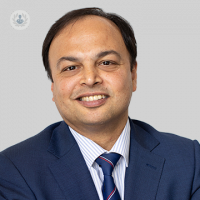Fertility: does COVID-19 really affect it?
Escrito por:The devastating and life-altering COVID-19 pandemic has certainly reshaped daily life as we once knew it. As a result, it is and has almost been near impossible to avoid letting various health-related concerns creep into our minds.
It has generally been thought that pregnant women fell into the high-risk category in terms of contracting COVID-19. To find out more about how the virus can potentially affect fertility in women, we asked renowned gynaecologist and fertility expert, Mr Parijat Bhattacharjee, to walk us through what contracting COVID-19 would potentially mean for pregnant women, or indeed, for women trying to or planning to get pregnant during the ongoing pandemic.

Does COVID-19 affect fertility in women?
No. COVID-19 does not affect fertility in any way. In the evidence that we have gathered so far, COVID-19 neither affects fertility (a spontaneous conception) nor does it interfere with any other fertility treatments, such as IVF. Therefore, there is no reason to restrict any fertility treatment or trying for a pregnancy on the basis of the pandemic, strictly speaking.
Of course, when it comes to pregnancy; even though the vast majority of pregnant women will be absolutely fine; a small handful of women do indeed suffer from some serious health complications, particularly in the third trimester of pregnancy and in cases where women have underlying health conditions.
At present, the overall consensus is that there is currently no evidence of any harm to unborn babies and pregnant women with any of the COVID-19 vaccinations, and therefore, pregnant women or women undergoing fertility treatment should absolutely go ahead as normal and not defer getting the COVID-19 vaccination.
In relation to avoiding any potential blood clots, if anyone is getting a vaccine while pregnant, then the Pfizer vaccine is highly recommended.
What are the latest developments in relation to the treatment of infertility?
If there is a major problem with the sperm count, the sperm shape, or the sperm structure, then fertility-specialist treatment options such as ICSI are available. In almost all cases of fertility-related problems or difficulties, IVF treatment almost always gives a very good chance of conception.
Other effective treatment options include the distribution of various fertility-treating medications and various surgeries such as laparoscopic ovarian drilling. If, however, the abovementioned treatment options don’t work, an IVF cycle treatment can work.
There are also numerous amounts of minimally invasive surgical procedures available to effectively treat infertility. Of course, there are other avenues nowadays such as egg freezing, which can be a very effective way to be able to conceive after a certain number of years.
What are the main factors that influence fertility?
A woman's age is hugely important when it comes to fertility issues, because it is not just about the number of eggs, but also the overall quality of eggs. Generally, after the age of 35 and definitely after the age of 38 to 40 years of age, the quality of the eggs really does matter as eggs cannot be reproduced.

What should be considered prior to having treatment for infertility?
In general, simple and general lifestyle factors should be carefully considered. Age also very much needs to be considered. Also, before deciding to undergo infertility treatment, one should really consider undertaking the healthiest lifestyle possible, as this can really help one’s chances of increasing their chances of conceiving.
Mr Parijat Bhattacharjee is a highly renowned and esteemed London-based fertility consultant. If you have any concerns relating to pregnancy and the potential risks of contracting COVID-19 while pregnant, you can consult directly with Mr Bhattacharjee by checking out his Top Doctors profile here.


